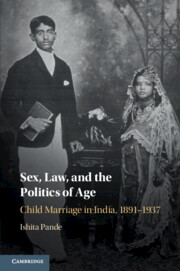Book contents
- Sex, Law, and the Politics of Age
- Sex, Law, and the Politics of Age
- Copyright page
- Dedication
- Contents
- Figures
- Acknowledgments
- Introduction
- Part I Provincializing Childhood
- 1 The Autoptic Child
- 2 The Juridical Child
- Part II Queering Age Stratification
- Part III Consent Otherwise
- Epilogue
- Works Cited
- Index
2 - The Juridical Child
The Child Marriage Restraint Act (1929), Global Biopolitics, and the “Digits of Age”
from Part I - Provincializing Childhood
Published online by Cambridge University Press: 13 July 2020
- Sex, Law, and the Politics of Age
- Sex, Law, and the Politics of Age
- Copyright page
- Dedication
- Contents
- Figures
- Acknowledgments
- Introduction
- Part I Provincializing Childhood
- 1 The Autoptic Child
- 2 The Juridical Child
- Part II Queering Age Stratification
- Part III Consent Otherwise
- Epilogue
- Works Cited
- Index
Summary
This chapter locates the Child Marriage Restraint Act (1929) in the context of two sets of numbers – the census statistics that were used to measure the scale of the social problem of child marriages and the “digits of age” that were used to define the child in order to mitigate the problem. In doing so, it locates the history of the CMRA in a newly enlarged field of play – in the League of Nation’s transnational humanitarian program of child protection, on the one hand, and raging debates on “population” as a global problem, on the other. It argues that while age-based measurements of legal personhood might appear unremarkable now, age had to be made stable by several technologies of government. It examines how a range of nationalist positions came to be articulated as a choice over the age limits of childhood in interwar India. It scrutinizes how age could – or could not – be proved through forensic technologies and documentary evidence in colonial courtrooms. By taking age as a question of power and not a fact about the body, this chapter traces the juridical construction of the child.
Keywords
- Type
- Chapter
- Information
- Sex, Law, and the Politics of AgeChild Marriage in India, 1891–1937, pp. 72 - 120Publisher: Cambridge University PressPrint publication year: 2020



